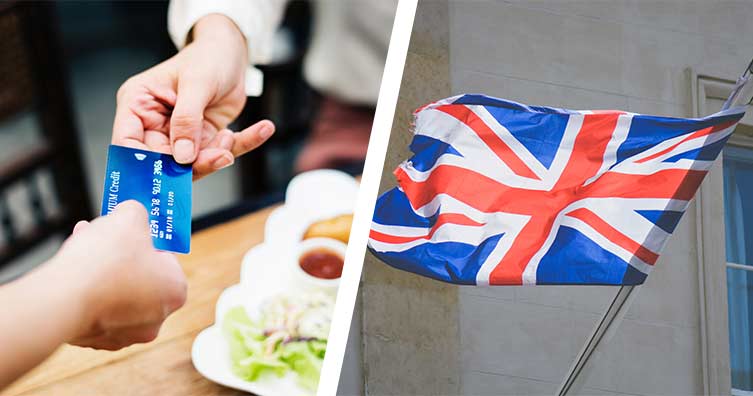Top UK bank accounts for international students 2023
Whether you're an international student studying in the UK on a year abroad or for your full degree, this guide will help you choose the best bank account for you.

Good news! Compared to many countries, banking in the UK as a foreign student is usually pretty easy. And there's a good amount of choice, too.
That said, finding your ideal bank account depends on your personal circumstances, including how long you're planning to stay in the UK as an international student.
First, we'll outline the most important things to consider, then list the best bank accounts for international students and suggest potential alternatives.
What's in this guide?
Why open a British bank account?
Setting up a bank account may feel like another boring life admin task to deal with. But it's worth investing the time as it could save you a fair amount of cash and headaches.
Managing your finances from your home country account can be impractical and expensive for many reasons:
- You'll be charged currency conversion fees each time you use your debit card or withdraw cash in the UK.
- Currency exchange rates fluctuate, making it harder to keep to a budget (convert currency using Wise for the best rates).
- If you're planning on working part-time, employers will want to pay your wages into a UK bank account.
- Your accommodation provider will likely prefer payments from a UK account.
- Setting up recurring payments (Direct Debits and standing orders) will be tricky or impossible. These are needed for paying mobile phone contracts, gym memberships and monthly rent.
- Paying back friends in the UK would be complicated.
- In some countries, banks require you to send them hand-written letters to set up Direct Debits to foreign accounts. Plus, they'll charge you a fee for the transfer!
- If you get locked out of your account because you've forgotten your PIN code, it's definitely easier to deal with it locally in a branch, rather than over the phone in another country.
Things to consider when opening a bank account
Does your current bank operate in the UK?
Many banks are operated by global corporations. Some banks will reduce fees for international money transfers if both accounts are registered with them.
It could also be much easier to open an account abroad. So, if you have an account with a bank that has branches in the UK, you might want to stick with the same one.
How much are international transfer fees?
This is an important one. If you're planning on sending or receiving money from home, make sure you find out exactly how much it costs to transfer money between countries.
Banks often take a commission fee of up to 3% for converting to your desired currency, and you might find there's another charge to send the money.
To work out how much you'll be paying in total, compare the exchange rate your bank is offering with an online currency converter and add the difference to their initial fee. We recommend using Wise to make larger conversions to £GBP.
We've got information on the fees for international accounts below.
How much do you value 'freebies'?
Some banks offer free items as incentives for you to trust them with your cash.
We explain the perks of each bank account below. But, usually, the kinds of offers include free cash or a complimentary subscription to a service.
Some banks also offer cashback when you shop using some of the offers they provide via loyalty programs.
Don't get sucked in by freebies alone. A bank account offering a £15 gift card won't be worth much if your transfer fees are ridiculously high.
Do you need an overdraft?
Your account may come with a small overdraft (for example, under £100). But, unfortunately, international students usually aren't able to apply for a big overdraft.
If you do have an overdraft, you might potentially find that there's a small buffer (£15 or £25, for example) that's interest-free. However, the remaining overdraft could have charges applied. Check the terms and conditions of each account for more info.
Bank accounts aimed specifically at international students generally don't come with an overdraft, as they don't consider you to be a long-term customer.
If you are planning on staying in the UK for more than a year, it might be worth looking at the overdrafts on offer with other accounts for when you decide to switch.
Where is the nearest bank branch located?
This might seem like an obvious one, but it's worth picking a bank that has a branch near your accommodation or university campus. This will be convenient in case you have to make an emergency trip before or after class.
You can withdraw cash from any bank's ATM free of charge, at any time of day. But if you want to go inside, it's worth knowing that banks usually shut around 4pm on weekdays and are closed on Sundays (and Saturdays in some cases).
How do you open a bank account in the UK?

Credit: WAYHOME studio – Shutterstock
Unless your bank states otherwise, or your bank account is exclusively available online, it's likely that you'll have to go to your local branch to open the account.
What do you need to open an international student bank account?
In most cases, you'll need some or all of the following documents to open an international student bank account:
- An in-date passport
- A valid visa
- A bank statement from your home bank, from the past three months
- Proof of address in the UK or abroad (check with your bank)
- Student ID or an acceptance letter from your university.
Can you open a UK bank account from abroad?
In some cases, you will be able to open a UK bank account from overseas. So, if you're still in your home country while reading this and you're keen to set up an account quickly, have a look for UK banks that will let you start setting up a bank account before you arrive ashore.
Get in touch with your current provider and check if they have links to UK banks. This will make the whole process a lot easier for you as you'll already be on their customer database.
Be aware that 'international accounts' offered by UK banks are different to 'international student accounts' and often have more requirements.
Below are the best international student bank accounts for this year, taking into account the fees and other considerations we've covered above.
International student account reviews
NatWest Select Account
NatWest used to offer an account specifically for international students in the UK. Similar to the NatWest Student Current Account, this account came with sign-up incentives.
Sadly, that account is no longer available. But the good news is that you can still apply for a NatWest Select Account, which is a great choice in its own right.
For starters, this account comes with the option of an overdraft. However, it’s worth noting that, unlike student bank accounts, this overdraft will charge interest, meaning you’ll end up repaying more than you borrow. What’s more, as with any overdraft, there’s no guarantee that everyone who applies for one will be accepted.
Unlike the international student account that NatWest previously offered, the Select Account is free to open and use – there is no monthly fee required to maintain the account.
But we know that, as an international student, you’ll want to send and receive money from overseas as cheaply as possible. With NatWest’s Select Account, the international transfer fees are very low, and in the case of sending money abroad, you’ll only pay if you need the money to be sent quickly.
How much are NatWest’s international transfer fees?
- Sending money abroad in all currencies (standard): free
- Sending money abroad in all currencies (urgent): £15
- Receiving money from abroad in euros: free
- Receiving money from abroad in all other currencies: £1 to receive under £100 and £7 for amounts £100 or greater.
Eligibility criteria
- Be aged 18 or over
- Be a UK resident.
Our review
The Select Account is a good choice for international students planning to study in the UK. Not only is it a cheap option for sending and receiving money across borders, but there’s also the option to apply for an account online. This means that you could even apply before you’ve left your home country.
That said, we’d strongly recommend looking at the list of proofs of identity that NatWest accept, particularly if you’re looking to apply in person in a branch of the bank.
Many of the options are only available to people from the EU or EEA, so if you’re coming to the UK from further afield, you’ll need to come prepared with the appropriate documents.
RBS Select Account
RBS (Royal Bank of Scotland) and NatWest are part of the same banking group. So, you might realise fairly quickly that as well as both having a Select Account, the terms and the fees are pretty much exactly the same too.
Despite the name, RBS branches can be found across the UK, not just in Scotland. If you like the look of the terms of the Select Account and you’re unsure whether to go with RBS or NatWest, it might be wise to see which bank has a branch located close to your university.
That way, if you ever need to speak to someone in person or deposit some cash, you won’t have far to travel to do so.
Like NatWest’s Select Account, this offering from RBS also comes with the option of an overdraft. But again, how big an overdraft you get (if any) depends on your personal circumstances, and there will be interest charged on the amount you borrow.
The international transfer fees associated with RBS’ Select Account are the same as NatWest’s, but here they are again for good measure:
How much are RBS’ international transfer fees?
- Sending money abroad in all currencies (standard): free
- Sending money abroad in all currencies (urgent): £15
- Receiving money from abroad in euros: free
- Receiving money from abroad in all other currencies: £1 to receive under £100 and £7 for amounts £100 or greater.
Eligibility criteria
- Be aged 18 or over
- Be a UK resident.
Our review
Unlike a student bank account, the overdraft attached to the RBS Select Account does charge interest – and that’s if you’re even accepted for one in the first place. With that in mind, it’s probably not worth applying for this account just for the option of an overdraft.
The low international transfer fees, on the other hand, are hard to argue with, particularly if you’ll be sending money abroad regularly.
HSBC Bank Account for International Students
HSBC has a special bank account for international students. Do keep in mind that this account doesn’t give you access to any credit facilities, including an overdraft or loans.
If you’re already an HSBC customer, you can even set up this account before you arrive in the UK. If you’re a new customer, you can open an account in the UK.
How much are HSBC’s international transfer fees?
- Sending money abroad to HSBC accounts: free
- Sending money to non-HSBC accounts in EEA countries in euros: free
- Sending money to non-HSBC accounts in all other countries and currencies: £5
- Receiving money from countries outside the UK in pounds: £5
- Receiving money from all other countries in all currencies: £5.
Eligibility criteria
- Be aged 18 or over
- Have proof of address in the UK and a valid ID.
Our review
The international transfer fees attached to this account are a little steeper than some of the others we’ve covered so far. If you’ll be sending and receiving a lot of money while you’re in the UK, you may want to look at other accounts.
Helpfully, if you already have an HSBC account in another country, opening an account with them in the UK is much easier and can be done before you arrive. Visit HSBC’s website for more information.
Barclays Bank Account
Like NatWest, Barclays used to offer a specific account for international students in the UK. While this account doesn’t exist anymore, international students can still apply for their regular bank account instead.
To open a bank account with Barclays as an international student, you need a UK biometric residence permit.
The account also comes with an overdraft. However, you should be aware that the size of overdraft you’re actually entitled to will vary from person to person, and you may not be given access to one at all.
The international transfer fees attached to this account are also impressively low.
How much are Barclays’ international transfer fees?
- Sending money abroad in all currencies: free
- Receiving money from abroad in euros: free
- Receiving money from abroad in all other currencies: free to receive under £100 and £6 for amounts over £100.
Eligibility criteria
- Be aged 18 or over
- Have a valid photo ID.
Our review
Pretty good! This account has free outgoing money transfers and fairly low recipient fees. Plus, there isn’t a monthly account fee to maintain it and it comes with a possibility of an overdraft.
If you don’t have a UK mobile number yet, you can still apply for a Barclays bank account online. You do, however, need a UK biometric residence permit – but you usually get one of these if you come to the UK for six months or longer.
Lloyds Classic Account
Another bank account you can open as an international student is with Lloyds. Their classic account could be good for students who haven’t been a resident in the UK for at least three years. As long as you currently reside in the UK, you can open this account.
If you sign up for Everyday Offers, it’s possible to get up to 15% cashback when you use your Lloyds debit card at some retailers. Find out more about cashback in our guide.
How much are Lloyds international transfer fees?
- Sending money abroad in euros: free
- Sending money abroad in all other currencies: £9.50
- Receiving money from abroad in euros: free
- Receiving money from abroad in all other currencies: £2 to receive under £100 and £7 for amounts over £100.
Eligibility criteria
- Be aged 18 or over
- Have a UK address.
Our review
You won’t be able to open this one until you’re actually living in the UK. However, the potential cashback is a bonus.
This is quite a simple account with some good aspects, but it’s worth thinking about whether you’ll be receiving much money from abroad while living in the UK. If so, an account with lower receiving fees might be better.
Santander Basic Current Account
The Santander Basic Current Account can suit people who have recently moved to the UK to study or work.
Although there’s unfortunately not an overdraft option with this account, the account is an opportunity to build your UK credit history. This is one of the best ways to increase your chances of getting an overdraft in future.
There’s also the possibility of earning cashback when you use your Santander debit card at one of a number of major UK retailers if you sign up for Boosts.
How much are Santander’s international transfer fees?
- Sending money abroad in the Single Euro Payments Area (SEPA): free
- Sending money abroad to all other countries: £25
- Receiving money from abroad in all currencies: free.
Eligibility criteria
- Be aged 16 or over
- Have a UK residential address.
Our review
Santander’s transfer fees are among the highest for sending money outside of Europe.
But, it’s free to receive money in any foreign currency, as long as the transfer’s made electronically rather than by cheque deposit (for which there’s a £10 charge). So, if you expect to be receiving a lot of money from abroad but not sending much within Europe, this account could be the one for you.
TSB Spend & Save Account
The TSB Spend & Save Account is open to UK residents aged 18 or over, so you’ll need to wait until you’ve moved to the UK to open this account.
One big perk of the account is that you can earn £5 cashback for up to the first six months if you make 20 payments or more on your debit card each month.
It comes with great features like Savings Pots to keep money aside to help you save. Plus, there’s a Save the Pennies option which lets you automatically save money every time you use your debit card. This feature rounds up payments to the nearest pound and puts away those extra pennies into a Savings Pot or a TSB savings account.
There’s also an Auto Balancer feature that allows you to set a minimum balance on your account. If your balance ever goes below your minimum amount, money will automatically be moved from a Savings Pot to help you avoid going into your overdraft (if you have one).
To access the features of this account, you’ll need TSB’s mobile banking app.
How much are TSB’s international transfer fees?
- Sending money abroad in euros to an EEA country: free
- Sending money abroad in all other currencies to all countries: £10 to send £5,000 or less and £17.50 to send over £5,000
- Receiving money from abroad in euros: free
- Receiving money from abroad in all other currencies: £2 to receive £100 or less and £7 for amounts over £100.
Eligibility criteria
- Be aged 18 or over
- Be a UK resident.
Our review
The main benefit of this account is that it has several saving features, which could really help you save money during your studies in the UK.
However, if you’re planning to send or receive money from abroad in non-euro foreign currency, remember that there are several other accounts with lower fees on this list.
Also, bear in mind that you’ll need to have moved to the UK to open the account.
If you’re worried about missing out on the money-saving options, why not do something similar yourself, like the 1p savings challenge? Or, you could always download an automatic savings app that can replicate many of the same features as this TSB account.
Al Rayan Personal Current Account
For those looking for a Sharia-compliant current account, you’ve come to the right place.
This account does require some financial investment, though.
If you don’t hold a UK passport and your main residence isn’t in the UK (which is likely to be the case for most international students), you’ll generally have to pay £20 per month to maintain the account. See the fee information document on Al Rayan’s website for more information.
There’s also a £5 fee for transactions made at the Knightsbridge branch (with a max fee of £5 per day).
How much are Al Rayan’s international transfer fees?
- Sending money abroad in pounds (from a £ account): £25
- Sending money abroad in euros (from a € account): €40
- Sending money abroad in US dollars (from a $ account): $40
- Additional correspondent bank/agency fee for payments outside of the EEA: £16/€20/$20
- Sending money abroad in all other foreign currencies: £12 for payments under £10,000, free for payments over £10,000.
- Receiving money from abroad in all currencies: free.
Eligibility criteria
- Be aged 16 or over.
Our review
If you’re looking for a Sharia-compliant current account, this one could be for you. Al Rayan also does Sharia-compliant savings accounts too if you’re thinking about staying in the UK on a long-term basis.
Just remember that opening an account at Al Rayan does require some financial commitment and the fees for sending money abroad are pretty sizeable.
Alternatives to setting up a UK bank account
With the recent surge of digital app-based banks launching in the UK, there is even more choice than before.
Not all of these bank accounts are suitable for international students, nor are they regulated as strictly as mainstream banks.
However, there are plenty of benefits on offer, especially when it comes to making cheap international transfers and speed of account setup.
Using your overseas account
Of course, you could always stick with your bank account in your home country.
You might decide that all of the above is too much hassle after all, especially if you’re only in Britain for a couple of months.
But do make sure you double-check how much it’ll cost you to withdraw money and pay with your debit card in the UK.
If you do decide to go with this option, we highly recommend you combine it with one of the two app-based accounts mentioned above to avoid extortionate transfer fees.
Lastly, make sure you let your bank know that you’re coming to the UK or else they might think your card has been stolen and block your account on the grounds of suspicious activity. They’re not mind-readers after all!
Now that you’ve got your bank account sorted, why not have a look at the funding available for international students to fill it with?
























